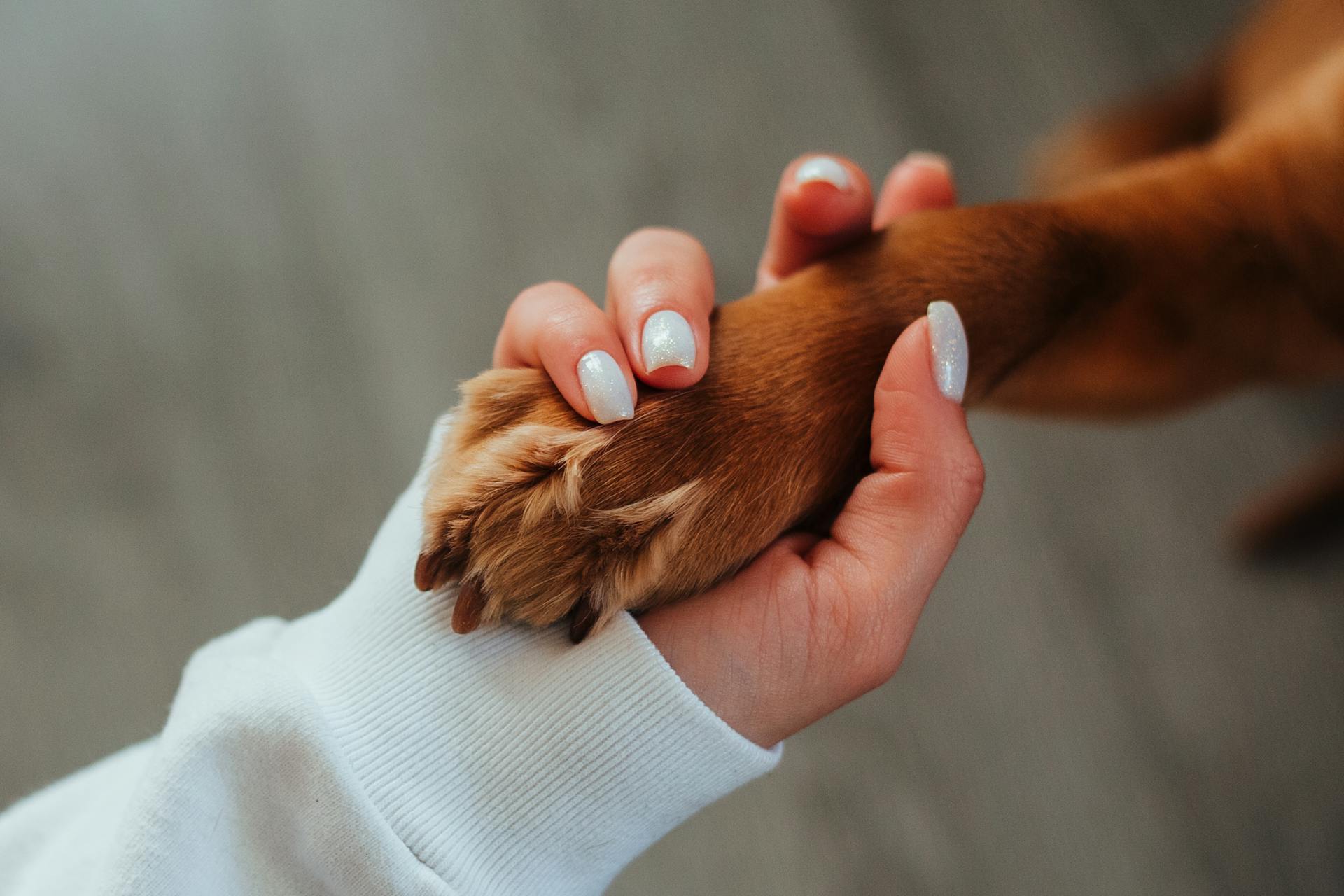
Shih Tzus are prone to eye problems, with 80% of the breed suffering from some form of eye issue due to their large eyes and shallow eye sockets.
Their eyes are particularly vulnerable to issues like cherry eye, cataracts, and progressive retinal atrophy.
Regular eye exams can help identify potential problems early on, reducing the risk of long-term damage.
Eye problems can be expensive to treat, so it's essential to budget for regular eye care.
Shih Tzus are also at risk for dental issues, with 70% of the breed experiencing tooth decay and gum disease due to their small jaw size and crowded teeth.
Regular dental care, including brushing and veterinary check-ups, can help prevent these issues.
Their small size also makes them prone to obesity, with 60% of Shih Tzus being overweight or obese due to overfeeding and lack of exercise.
Worth a look: Taking Care of Shih Tzu
Dental Health
Dental disease is the most common chronic problem in pets, affecting 80% of all dogs by age two, and your Shih Tzu is more likely than other dogs to have problems with her teeth.
Your Shih Tzu's teeth can easily overcrowd their small mouths, leading to tartar and plaque development. This overcrowding is a common issue in Shih Tzus.
Regular teeth brushing is essential to prevent dental disease, and you should brush your Shih Tzu's teeth every day with a dog-safe toothpaste and brush. This will help remove tartar and plaque.
Teeth abnormalities are often genetically induced and are relatively common in dogs, especially in purebred dogs like your Shih Tzu. An overbite or underbite is called a malocclusion or a bad bite.
Your Shih Tzu's life span may be cut short by one to three years if dental disease is not prevented or treated. Regular veterinary appointments and professional dental cleanings under anesthesia can help prevent this.
Misaligned teeth can also occur and cause lots of problems, but can usually be corrected with braces or extractions. Yes, dogs can get braces!
Infections and Illnesses
Shih Tzus are susceptible to bacterial and viral infections, such as parvo, rabies, and distemper, which are preventable through vaccination. Many of these infections can be prevented with the right vaccination schedule, tailored to your area and your dog's age.
Discover more: Symptoms of over Vaccination in Dogs
Ear infections are also a common issue in Shih Tzus, often caused by a combination of factors that trap moisture in the ears. This can lead to red, painful, and itchy ears, and may require treatment with topical and/or oral medications.
Some common illnesses and injuries that Shih Tzus may experience include ear infections, dental disease, urinary tract infections, eye problems, kidney disease, hip dysplasia, bone and joint problems, and glaucoma.
Additional reading: Do Purebred Dogs Have More Health Problems
Parasites
Parasites can invade your Shih Tzu's body, inside and out, causing pain, discomfort, and even death.
Fleas, ticks, and ear mites are just a few examples of the many bugs that can infest your Shih Tzu's skin and ears.
Hookworms, roundworms, heartworms, and whipworms can get into your Shih Tzu's system by drinking unclean water, walking on contaminated soil, or being bitten by an infected mosquito.
Some of these parasites can be transmitted to you or a family member, making regular testing a serious concern for everyone.
Parasites can be prevented with regular testing and preventive medication as necessary to keep your Shih Tzu healthy.
Common Illnesses and Injuries
Shih Tzus are prone to ear infections due to hair growing inside their ear canals, which holds onto moisture and can cause inflammation and infection.
Ear infections can be painful and itchy, and are often treated with topical and/or oral medications. Your veterinarian will assess for ear infections with a thorough examination.
Shih Tzus also need to be protected from bacterial and viral infections like parvo, rabies, and distemper, which are preventable through vaccination.
Here are some common illnesses and injuries to be aware of at different stages of your Shih Tzu's life:
- Ear infections
- Dental disease
- Urinary tract infections
- Eye problems
- Kidney disease
- Hip dysplasia
- Bone and joint problems
- Glaucoma
Shih Tzus are sensitive to warm weather and prone to heat stress due to their short snout. Regular ear cleaning with a vet-approved ear cleaner can help reduce the chances of ear infections.
Nutrition and Diet
As a Shih Tzu owner, you want to ensure your furry friend is getting the nutrients they need to stay healthy and happy. Shih Tzus are prone to obesity, so it's essential to feed them a well-balanced diet and limit treats.
A twice-daily, balanced adult small-bite diet is recommended for Shih Tzus. Pet parents should also consider feeding their Shih Tzu dry kibble instead of canned food to lessen the risk of periodontal disease.
Shih Tzus need to eat frequent meals, about three or four every day, to avoid risks of hypoglycemia (low blood sugar). High-fat, protein, and complex carbohydrate meals will lessen the risk of low blood sugar issues.
Shih Tzus only need up to one cup of dry dog food a day, divided into two or three meals. This is because they're not high-energy dogs and are prone to weight gain.
To keep your Shih Tzu's coat healthy and luxurious, feed them a protein-rich diet balanced with omega-3 and omega-6 fatty acids.
Here's a summary of the daily food needs for Shih Tzus:
Your veterinarian can help you calculate the right daily calories for your Shih Tzu to avoid weight gain. When choosing a diet for your Shih Tzu, choose a small-breed food to allow for easy chewing.
Health Issues
Shih Tzus are generally a healthy breed, but like any other breed, they can be prone to certain health issues. Their undershot jaw can lead to oral health problems, such as misaligned or missing teeth, and their prominent eyes make them more susceptible to eye issues like cataracts, retinal detachment, and corneal dryness.
Some common health issues that Shih Tzus may experience include ear infections, dental disease, urinary tract infections, eye problems, and kidney disease. Hip dysplasia and bone and joint problems, such as patellar luxation and intervertebral disc disease, are also common issues in Shih Tzus.
Here are some specific health issues to be aware of in Shih Tzus:
- Ear infections
- Dental disease
- Urinary tract infections
- Eye problems
- Kidney disease
- Hip dysplasia
- Patellar luxation
- Intervertebral disc disease
It's essential to keep an eye out for any signs of these health issues and to consult with a veterinarian if you notice anything unusual. By being aware of these potential health issues, you can take steps to prevent or manage them and ensure your Shih Tzu lives a happy and healthy life.
Obesity
Obesity can be a significant health problem in Shih Tzus, causing or worsening joint problems, metabolic and digestive disorders, back pain, and heart disease.
It's tempting to give your pal food when she looks at you with those soulful eyes, but you can "love her to death" with leftover people food and doggie treats. Instead, give her a hug, brush her fur or teeth, play a game with her, or perhaps take her for a walk. She’ll feel better, and so will you!
Shih Tzus aren’t exactly athletes, and because of this, they can often become overweight.
Limit treats to less than 10% of a dog’s daily calorie intake to prevent obesity and ensure your pup gets 20–30 minutes of controlled exercise, such as walks and playtime, daily.
Explore further: Can Wet Food Cause Diarrhea in Dogs
[Common Issues]
Shih Tzus are generally a healthy breed, but like any other breed, they can be prone to certain health issues. One common issue is hip dysplasia, which can cause arthritis and pain in the hind legs.
Discover more: All Shih Tzu Breed
Their undershot jaw can lead to oral health problems, such as misaligned or missing teeth, and may require a vet visit for extraction. Their prominent eyes also make them more prone to issues like cataracts, retinal detachment, corneal dryness, and progressive retinal atrophy.
Ear infections are another common issue in Shih Tzus, and can be caused by a variety of factors, including allergies and ear mites. Dental disease is also a concern, and can be caused by a buildup of tartar and plaque on the teeth.
Urinary tract infections can also occur in Shih Tzus, and may be caused by a bacterial infection or a blockage in the urinary tract. Kidney disease is another concern, and can be caused by a variety of factors, including genetics and age.
Here are some common health issues that can affect Shih Tzus:
- Hip dysplasia
- Ear infections
- Dental disease
- Urinary tract infections
- Kidney disease
- Intervertebral disc disease (IVDD)
- Patellar luxation
- Glaucoma
- Dry eye (KCS)
- Cataracts
It's essential to keep an eye out for any abnormal symptoms in your Shih Tzu, as they can be a sign of a serious disease. If you notice any unusual behavior or symptoms, it's always best to consult with a veterinarian to rule out any potential health issues.
Hyperadrenocorticism (Cushing's)
Hyperadrenocorticism, also known as Cushing's Disease, is a common problem in dogs that affects their adrenal glands, causing them to produce too much steroid hormone. This condition is more likely to occur in Shih Tzus.
The symptoms of Cushing's Disease can be easily missed, but they include excessive drinking and urination, increased appetite, and reduced activity level. Your dog's behavior may seem normal at first.
A potbelly, thin skin, and hair loss are later symptoms of Cushing's Disease, making it essential to monitor your dog's health closely. Treatment usually involves oral medications and requires close coordination with your veterinarian to ensure correct dosing.
Skin
Shih Tzus need regular grooming to prevent skin irritation and matting, so they require a weekly bath to keep their long coats healthy. This can help prevent redness, flakiness, or dryness on their skin.
Their skin can be prone to irritation, especially in areas like the feet, belly, and folds of the skin. Allergies can cause itching and inflammation in these areas, leading to symptoms like licking the paws, rubbing the face, and frequent ear infections.
Common signs of allergies in Shih Tzus include scratching, shaking their head, and a foul odor from the ears. If you notice any of these symptoms, it's essential to consult with a veterinarian to determine the underlying cause and develop a treatment plan.
In addition to allergies, ear infections can also cause discomfort and pain in Shih Tzus. These infections can be caused by swimming, overgrowth of hair in the ear canals, or accumulation of earwax. Regular monitoring and early treatment can help reduce the likelihood of eardrum damage and deafness.
You might enjoy: What Food Gives Dogs Diarrhea
Liver
Your Shih Tzu is more likely than other dogs to have a liver disorder called portosystemic shunt (PSS). This condition occurs when some of the blood supply meant for the liver goes around it instead, depriving the liver of the blood flow it needs to grow and function properly.
To check for PSS, we'll conduct a liver function test in addition to a standard pre-anesthetic panel every time your Shih Tzu undergoes anesthesia. This is crucial to ensure his liver can remove toxins from his bloodstream effectively.
If your Shih Tzu develops symptoms such as stunted growth or seizures, we'll test his blood and possibly conduct an ultrasound scan of his liver. This will help us determine the best course of action to address the issue.
Surgery may be needed to treat PSS, but in some cases, we can treat with a special diet and medication. This is a great option for owners who want to manage their dog's condition without resorting to surgery.
Kidney
Kidney issues are a significant concern for Shih Tzus.
Glomerulonephropathy is an inherited disease that slowly damages your Shih Tzu's kidneys, causing them to fail, often at an early age.
Shih Tzus are more likely to develop kidney stones than other breeds. Kidney stones are painful and can be a medical emergency if your dog has blood in their urine, can't urinate, or is straining to urinate.
Kidney disease can be diagnosed through a yearly urine analysis, which is recommended to detect excessive protein in the urine.
Early detection of kidney disease leads to a happier pet and an easier, more affordable treatment plan.
Bleeding Disorders
Bleeding Disorders are a serious health issue that can affect dogs. They can range in severity from very mild to very severe.
Many pets seem normal until a serious injury occurs or surgery is performed, and then severe bleeding can result. This is because the bleeding disorder can be inherited and may not show symptoms until a critical moment.
Von Willebrand’s disease is a blood clotting disorder frequently found in Shih Tzus. It's essential to be aware of this condition if you own a Shih Tzu.
We'll conduct diagnostic testing for blood clotting time or a specific DNA blood test for Von Willebrand’s disease and other similar disorders to check for this problem before we perform surgery. This can help prevent severe bleeding during surgery.
Brachycephalic Syndrome
Brachycephalic Syndrome is a common health issue in Shih Tzus. This condition affects dogs with short noses, like your Shih Tzu.
Their short noses have the same amount of tissue as longer-nosed dogs, but with less area to contain it. This can lead to a narrow and obstructed airway, making it hard for them to breathe.
Dogs with this condition often have small nostrils, a long soft palate, collapsing trachea, and extra tissue in the back of the throat. These abnormalities can cause trouble breathing.
Some common symptoms to watch for include exercise intolerance, loud breathing, coughing, bluish gums, or fainting. If you notice any of these symptoms, it's essential to seek veterinary help.
In severe cases, surgical correction may be recommended to alleviate airway obstruction. Your veterinarian can discuss this option with you if your Shih Tzu's condition is severe.
Here are some key characteristics of Brachycephalic Syndrome:
- Small nostrils
- A long, soft palate
- Collapsing trachea
- Extra tissue in the back of the throat
Guides
Pet insurance can be a lifesaver when your furry friend gets sick or injured. It's essential to understand how it works to make informed decisions.
The average cost of a vet visit can range from $50 to $200, depending on the type of care needed.
Determining if pet insurance is worth it involves considering factors such as your pet's age, health, and lifestyle. It's also crucial to compare plans to find the best fit for your needs and budget.
Readers also liked: Shih Tzu Insurance
New puppy owners often underestimate the costs of caring for a new pet. The initial costs of vaccinations, spaying/neutering, and microchipping can add up quickly.
Comparing pet insurance plans requires considering the deductible, copay, and maximum payout. You should also read reviews and ask for recommendations from other pet owners.
Ultimately, pet insurance can provide peace of mind and financial protection for your beloved pet.
Spay or Neuter
Spaying or neutering your Shih Tzu is one of the best things you can do for their health. It decreases the likelihood of certain types of cancers.
In females, spaying means surgically removing the ovaries and usually the uterus, and in males, neutering means surgically removing the testicles. This eliminates the possibility of your pet becoming pregnant or fathering unwanted puppies.
Having your pet spayed or neutered also gives your veterinarian a chance to identify and address some of the diseases your dog is likely to develop. This is a convenient time to perform other necessary procedures, such as hip X-rays or a puppy tooth extraction.
Routine blood testing before surgery helps identify and take precautions against common problems that increase anesthetic or surgical risk.
Intriguing read: How to Identify a Shih Tzu
Characteristics
As we explore the complex world of health issues, it's essential to understand the characteristics that define them. Many health issues are chronic, meaning they persist over a long period of time, such as diabetes or hypertension.
Chronic conditions can have a significant impact on daily life, making simple tasks like walking or cooking a challenge. Some people may experience symptoms like pain or fatigue that can't be easily managed.
The severity of health issues can vary greatly from person to person, making it difficult to predict how they will affect each individual. For example, some people with diabetes may need to take medication daily, while others may be able to manage their condition through diet and exercise alone.
Health issues can also be unpredictable, with symptoms flaring up at any moment. This unpredictability can be stressful and overwhelming, making it difficult to plan for the future.
In some cases, health issues can be triggered by specific factors, such as genetics or environmental toxins. For instance, people with a family history of heart disease may be more likely to develop the condition themselves.
The emotional toll of health issues should not be underestimated, as they can lead to feelings of anxiety, depression, and isolation. Many people struggle to cope with the emotional burden of their condition, which can further exacerbate symptoms.
Care and Maintenance
To keep your Shih Tzu happy and healthy, regular brushing and grooming is a must to keep her coat beautiful. This should be done regularly to prevent matting and tangling.
A Shih Tzu's diet is crucial, and they should be fed a high-quality diet appropriate for her age. Consistency is key, so avoid giving her people food.
- Shih Tzus need to be supervised as you would a toddler, keeping doors closed and picking up after yourself.
- They need a daily walk and regular inside play, especially since they're well suited for apartment living.
- Brush their teeth at least three times a week, as they often have serious problems with their teeth.
- Clean their ears weekly, even as a puppy.
Home Care
To keep your Shih Tzu happy and healthy, it's essential to watch her diet. Regular exercise is also crucial, so make sure she gets plenty of physical activity.
Brushing your Shih Tzu's teeth and coat regularly is a must. This helps prevent dental and coat problems.
Call us or a pet emergency hospital if something seems unusual with your Shih Tzu. This could be a sign of a serious issue that needs immediate attention.
Adhering to the recommended schedule of examinations and vaccinations is vital for your Shih Tzu's health. This ensures she receives the necessary check-ups and tests for common diseases and conditions.
Signing up for pet health insurance is another important step in caring for your Shih Tzu. This will help cover the costs of medical tests and procedures she may need throughout her life.
Caring for a

Caring for a Shih Tzu requires attention to their unique needs. They thrive on social interaction and can become anxious if left alone for too long.
Shih Tzus are generally happy and sociable dogs that prefer not to spend their time alone. They love to be around people and other animals of all ages. Socialization at a young age is crucial to avoid anxiety and bad behaviors like excessive barking or digging.
Exercise is essential for Shih Tzus, but they don't need a lot. A 30-minute walk and some at-home playtime should suffice. They love to be spoiled with attention and treats, and they're quick to learn new tricks.
Their long, luxurious double haircoat requires regular grooming. They don't shed much, but their coat is prone to tangling and matting. A "puppy cut" can help prevent continuous grooming, but if left uncut, their fur can grow so long it drags on the ground.
Here's a quick rundown of their grooming needs:
Their brachycephalic nature means they're at a higher risk for overheating or heatstroke. They need to stay out of the hot summer weather and stay hydrated.
Training and Exercise

Training a Shih Tzu requires patience, consistency, and positive reinforcement. Consistency is key when training your pup, so establish a routine and stick to it.
Shih Tzus can be difficult to housebreak, so indoor supervision is a must for some time. Crate training can be especially helpful when you travel, as it provides a safe space for your dog to relax.
With minimal exercise needs, a short daily walk or some indoor playtime should suffice. However, it's essential to remember that Shih Tzus were bred as lapdog companions and are generally happy to spend time indoors.
To keep your Shih Tzu's mind active, teach them new tricks and engage in playtime activities. They are highly intelligent and can learn a variety of commands and behaviors with positive reinforcement.
Here are some essential training tips to keep in mind:
- Establish a routine and stick to it
- Use positive reinforcement techniques, such as treats and praise
- Be patient and consistent, especially when housebreaking
- Consider crate training for travel and safety
Emergencies and Prevention
If you notice your Shih Tzu exhibiting any of the following signs, seek medical care immediately.
Scratching or shaking the head, tender ears, or ear discharge can indicate an ear infection that needs prompt attention. This is especially true if you've recently noticed a change in your Shih Tzu's behavior or appetite.
Inability or straining to urinate, discolored urine, and cloudiness, redness, itching, or any other abnormality involving the eyes are all warning signs that your Shih Tzu needs to see a vet ASAP.
Some common symptoms of serious health issues in Shih Tzus include slow or stunted growth, seizures after eating, and a potbelly with increased appetite and urination.
Here are some emergency signs to watch out for in your Shih Tzu:
- Scratching or shaking the head, tender ears, or ear discharge
- Inability or straining to urinate; discolored urine
- Cloudiness, redness, itching, or any other abnormality involving the eyes
- Slow or stunted growth; sometimes seizures after eating
- Drinks and urinates more, eats more, potbelly, poor haircoat
- Coughing, exercise intolerance, rapid breathing at rest
- Loud breathing, tires easily at exercise
- Leg stiffness, reluctance to rise, sit, use stairs, run, jump, or “bunny hopping”
Frequently Asked Questions
What is the leading cause of death in Shih Tzus?
According to statistics, the leading causes of death in Shih Tzus are gastrointestinal diseases and heart disease, each accounting for 7.9% of cases.
What is the normal life expectancy of a Shih Tzu?
The normal life expectancy of a Shih Tzu is 10 to 16 years, with some living up to 18 years or more with proper care.
What are the cons of owning a Shih Tzu?
Owning a Shih Tzu requires regular grooming and attention to prevent matting and shedding, as well as potential health issues and housebreaking challenges. Additionally, their independent nature can make them stubborn at times, requiring patient and consistent training.
Is congestive heart failure common in Shih Tzus?
Yes, congestive heart failure is a common health issue in older Shih Tzus, particularly due to valve deterioration. If you suspect your Shih Tzu has heart problems, we recommend diagnostic testing to determine the severity of the disease.
How can you tell if a Shih Tzu is in pain?
If your Shih Tzu is showing signs such as limping, panting excessively, or refusing to walk, it may be a sign that they're in pain. Look out for other subtle changes in behavior, appetite, and posture that could indicate discomfort or distress
Featured Images: pexels.com


